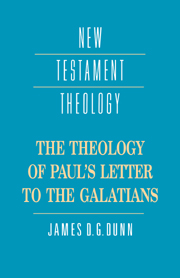Book contents
- Frontmatter
- Contents
- Editor's preface
- Preface
- List of abbreviations
- 1 Introduction
- 2 The make or break issues
- 3 The fundamental agreements
- 4 The heritage of Abraham
- 5 How should the heirs of Abraham live?
- 6 Lesser issues
- 7 The influence of Galatians in Christian thought
- List of further reading
- Index of references
- Index of names
- Index of subjects
4 - The heritage of Abraham
Published online by Cambridge University Press: 05 June 2012
- Frontmatter
- Contents
- Editor's preface
- Preface
- List of abbreviations
- 1 Introduction
- 2 The make or break issues
- 3 The fundamental agreements
- 4 The heritage of Abraham
- 5 How should the heirs of Abraham live?
- 6 Lesser issues
- 7 The influence of Galatians in Christian thought
- List of further reading
- Index of references
- Index of names
- Index of subjects
Summary
In chapter 3 we concentrated on those features of the theology of Galatians which Paul held in common with his readers and other Christian Jews. Now we turn to the issues in dispute between Paul and the other missionaries. That is to say, we begin to investigate more closely the points at which Paul pressed beyond the shared convictions and experiences. Paul, of course, saw these points as integral to the shared convictions, as the inevitably corollary of the shared experiences. But evidently others, the other missionaries in particular, would have disputed that viewpoint, and with some vehemence.
What we are about to explore, therefore, are the points at which Paul was developing his own theology. Because of the canonical significance of the letter Christians have long since recognized these points as fundamental expressions of Christian faith. But we do well to realize that what we are about to look at was new theology, theology being freshly minted to meet the challenge of the occasion. In Galatians, as we noted at the beginning, we encounter theology in the making. Whether Paul had formulated these points before this we cannot tell. Certainly the degree to which they appear in Galatians as the response to the particular crisis in Galatia suggests that Paul was expressing himself in a new and forceful way. To repeat, he himself would not think of the points as innovative; for him they were simply a matter of spelling out the truth of the gospel and the significance of the cross.
- Type
- Chapter
- Information
- The Theology of Paul's Letter to the Galatians , pp. 64 - 100Publisher: Cambridge University PressPrint publication year: 1993



